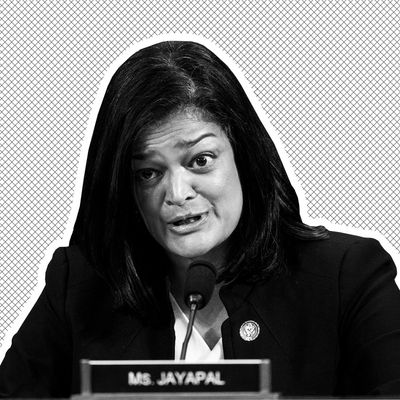
For a fleeting few weeks, it seemed as though the Democratic establishment was really going to fight for a $15 federal minimum wage. It is an incredibly popular policy proposal, one that would lift over a million Americans out of poverty and boost the economy. It’s also long overdue and desperately needed, given the burden the coronavirus pandemic has placed on low-wage workers. As recently as January, the party appeared united behind passing it, and then, after campaigning on the issue, President Joe Biden included a $15 federal minimum wage hike in his $1.9 trillion coronavirus relief bill.
And yet, despite a Democratic majority in Congress and a Democrat in the White House, the prospects of a $15 minimum wage are looking increasingly slim, mangled in procedural problems and stymied by lack of leadership from the executive branch. Two conservative Democrats — Joe Manchin of West Virginia and Kyrsten Sinema of Arizona — refuse to support the measure. But even before they had the chance to vote, it faced another hurdle: a complicated, arcane rule that may have sunk it altogether.
Democrats attempted to pass the wage hike with the COVID relief bill through a process called budget reconciliation, a strategy that requires the approval of an unelected official called the Senate parliamentarian. Last week, the parliamentarian ruled against including the $15 minimum wage, deeming it “extraneous.” Technically, her decision is only an advisory statement — Vice-President Kamala Harris, the chairwoman of the Senate, has the final say, and can overrule her. But the White House almost immediately said they would not be doing so: Press Secretary Jen Psaki repeatedly said that the president and the vice-president “respect the rules of the Senate.”
Those rules, progressive Democrats argue, are keeping the party from actually accomplishing anything in one of the most difficult moments in American history. The House has passed the COVID relief bill with the $15 minimum included, and as the bill makes its way to the Senate, members are urging for the president to overrule the parliamentarian. “If there has ever been an urgent moment to do something like this, it is now,” Representative Pramila Jayapal of Washington, the leader of the Progressive Caucus, tells the Cut. “We’ve gotta be able to show we can deliver … I don’t know how anyone can sleep at night thinking about people who have to make it on $15,000 a year.”
In a phone interview, Jayapal explained the progressive wing’s strategy on dealing with the parliamentarian, the path forward for the $15 minimum, and why the fight against “rules” is far from over:
Progressives are asking VP Kamala Harris to overrule the parliamentarian. Why?
The $15 minimum wage is an incredibly popular and populist policy. It’s popular with Republicans, Independents, and Democrats. It has won every time it’s been put on the ballot, including in red states and in Florida, it passed with a supermajority of voters. It is something that we ran on as Democrats. We said, “Listen, if you give us the House, the Senate, and the White House, we’re going to deliver a raise for 32 million workers.” We can’t go back to voters and say that the parliamentarian, procedural rules stopped us from doing this. We just have to figure out a way to get it done.
The only two ways forward that I see are to include it in reconciliation or to reform the filibuster. There is no scenario in which we’re going to get 60 votes [the supermajority required to end filibuster debate and move legislation to a vote]. Republicans have not been interested in working with us, even on policies that are very populist and popular in their states. So that is why we have called on the White House to do this — to say thank you very much to the parliamentarian for her advisory opinion and to do what other vice-presidents have done. If there has ever been an urgent moment to do something like this, it is now, and that is both from a policy perspective and from a political perspective. How are we going to keep the Senate or keep the House in two years? We’ve gotta be able to show we can deliver. We can’t just allow Mitch McConnell and the Senate filibuster basically to have a veto power over everything the Democrats have promised to do.
Moderate Senate Democrats who have indicated they don’t support the $15 hike — namely Joe Manchin and Krysten Sinema — seem to have a veto power, too. Why is the White House allowing them to torpedo this measure before it even gets to the floor?
I think there are probably a couple of things going on. One is they need both of their votes for [Cabinet] confirmations. But I think the bigger thing here is that the White House still has to come to terms with the fact that we’re not going to be able to do things in a bipartisan way and that they’re going to have to muscle things through. They’re committed to getting the $1.9 trillion [COVID relief package] done. Joe Biden started out strong on the $15 minimum wage, and they have to commit to that in the same way. I don’t think that Joe Manchin and Kyrsten Sinema are going to vote against a $1.9 trillion COVID release bill that has a $15 minimum wage in it. And that’s why it’s a very good place to get it done.
As the chairman of the Progressive Caucus, I am in close touch with the Senate progressives, Senator Sanders, Ron Wyden, Senator Warren. We signaled early to the White House all these things that were priorities for us. Nobody is surprised by what I’m saying. We had already signaled concern when President Biden said, just the weekend before we started voting in committee, that he didn’t think minimum wage was going to make it. And it was just a gut punch to millions of people across the country. Our phones started blowing up, and immediately I got on the phone with the White House and was told he was just speaking his fears and that he was still committed to it. But the truth is that his words matter and they show how willing or unwilling he is to fight for something.
What does it say about the Senate as an institution if they cannot pass this extremely popular bare-minimum legislation during a pandemic?
I really believe the Senate is broken. There’s the sense that the House is this wild place and the Senate is this dignified, distinguished place that has rules. But, of course, if you look at the history of the Senate, those very rules were put in place by white Southern segregationists to maintain their power and in opposition to civil rights. And that is the history and the legacy of many of those procedures, including the filibuster. This idea that an unelected — and I’m not being negative to the parliamentarian, it’s just a fact, she’s not an elected official … she offers an advisory opinion.
If Republicans could use reconciliation to cut the individual mandate payment to zero and to kick tens of millions of people off of their health-care plans, then Democrats should be able to use reconciliation to increase the minimum wage.
You’ve just introduced Ultra-Millionaire Tax Act with Senator Warren, which would place a 2 percent annual tax on the net worth of households between $50 million and $1 billion, and a 3 percent tax overall on those above $1 billion. Do you think it will fare any better?
Jen Psaki was asked about it at the podium yesterday morning, and she didn’t say the president was against it. And, by the way, the wealth tax would qualify for reconciliation. It is a tax measure. But look, the minimum wage [provision] is targeting help to the lowest wage workers, and this is targeting the highest wealth individuals. You can’t ignore it anymore after COVID — billionaires have become $1.3 trillion richer, while you’ve got families struggling to put food on the table, lines growing at food banks across the country, people struggling to pay their rent.
This is a structural issue that needs to be addressed and has only gotten massively worse during COVID. It’s a very small amount of money from the hundred thousand wealthiest families, which by the way, is only 0.05 of one percent. So 99.95 percent will not pay anything, and a hundred thousand families will generate $3 trillion over ten years, which can then be invested into the things that we really need.
It will be a huge problem for progressives if the president’s answer for every piece of legislation continues to be, “I respect the rules of the Senate.”
I think that that’s going to change very quickly. The president and the Senate leadership are going to be very quickly facing a crossroads if they continue to be the graveyard where things go to die. That’s what we used to call the Senate under Mitch McConnell. We should not have to twist ourselves into pretzels to pass legislation — the fact that we’re using reconciliation is because of the filibuster. We wouldn’t have to if we didn’t have the filibuster. And if it doesn’t change under Majority Leader Schumer and with a President Biden, then we’re going to have a real problem in two years when we try to convince voters that they should give us a shot again.


